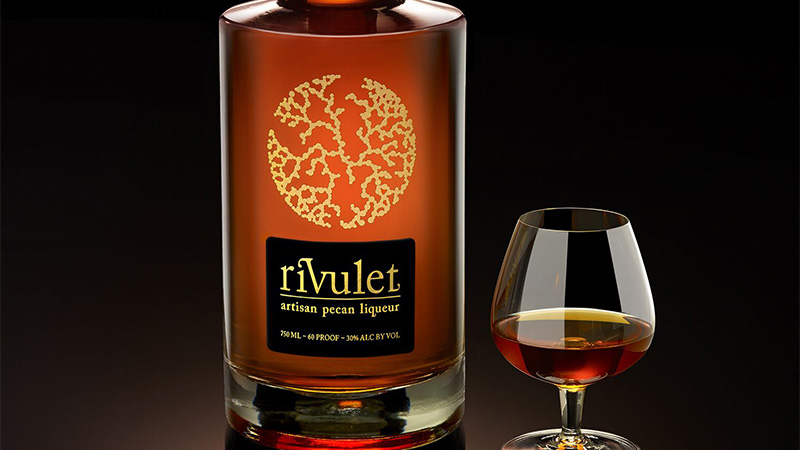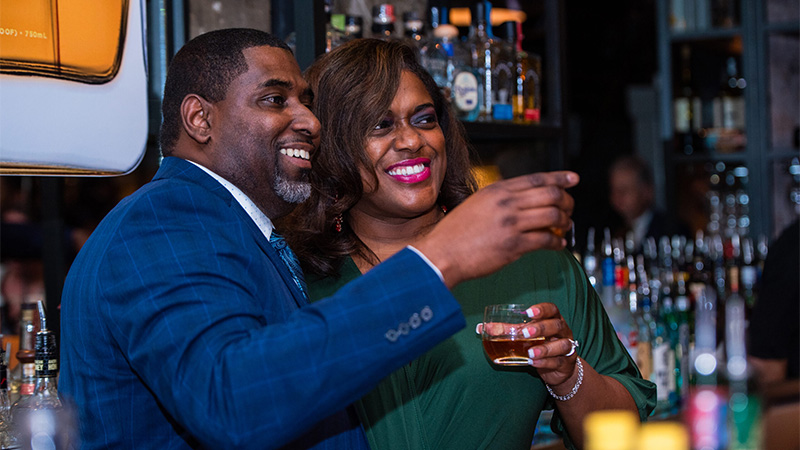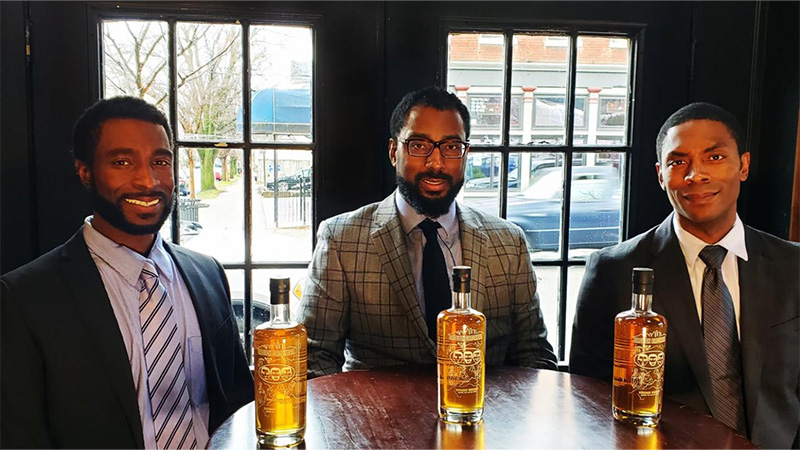In May of 1964, Congress famously declared bourbon a “distinctive product” of the U.S. By that point, America’s “native spirit” had been produced — both legally and illicitly — for two centuries. And nowhere did the spirit have more of an impact than Kentucky, where bourbon is now a $9 billion industry, and where (according to a much-repeated, unverified estimate) more than 90 percent of the world’s supply is produced.
Two months after that official declaration about bourbon, Congress passed a much more landmark piece of legislation: the Civil Rights Act. It was a coincidence that both happened in the same summer. Still, as American society slowly started to racially integrate, the ownership class of the Kentucky bourbon industry evolved even slower. There had been African Americans in the industry since its inception: from enslaved people working stills in the 1800s, all the way to Bourbon Hall of Fame member and Buffalo Trace tour guide Freddie Johnson becoming a widely recognized figure in the industry. But in terms of distillery ownership, the demographics remained stubbornly white for generations.
Half a century after that summer of 1964, the needle has edged forward slightly. According to the Distillery Trail, which maintains a directory of 2,000-plus U.S. distilleries, 45 are Black-owned, with three of those in Kentucky. One, Rivulet Liqueur, focuses on an artisan pecan liqueur, while the other two, Brough Brothers in Louisville and Fresh Bourbon in Lexington, are gaining ground in the bourbon space. Both of those brands are fighting for a foothold — and a slice of the sales and tourism revenue generated by the $9 billion industry that white-owned companies have dominated for so long. It’s no simple feat.
“Some of these families have been around for 150 years,” says Brough Brothers CEO Victor Yarbrough. “Their names are on the buildings now. If you have a 100-year head start, you’re going to be in control. … Eventually, times start to change, laws change, societal norms change, and it’s acceptable for a Black family to own a distillery. Not saying it’s an easy path.”
The Uphill Historical Climb
Making a splash in an already saturated space like Kentucky bourbon is difficult enough. To do it as part of an historically marginalized group has its own challenges. In an industry that can have such a high financial barrier to entry — costs of distilling equipment, property, supplies, permitting, etc. — a lack of access to capital stops many potential owners before they even start. In this context, there’s specific, entrenched history for Black owners to overcome. The racial wealth gap in the U.S. is still significant. For every $100 in wealth of a white household, Black households only hold $15, according to 2022 data from the Brookings Institution.

That gap can be exacerbated by neighborhood, too. In the Yarbrough brothers’ home neighborhood, the West End of Louisville, poverty rates are much higher than the city’s east side. Growing up, the Yarbrough family wasn’t in dire straits. But they also weren’t strangers to eating tuna sandwiches when money was tight. When Victor and his two brothers, Christian and Bryson, launched their bourbon brand, they pooled their money, along with their spouses’, to self-fund everything. Victor, who had worked in finance for several large banks, quit his job to start the business — and went back to tuna sandwiches for a while until it was off the ground.
For most potential business owners without generational wealth, loans are the next option. And in 1977, legislation was passed to fight racial discrimination in lending. But a gap has remained there, too. According to the 2021 Small Business Credit Survey, Black business owners are more likely to be denied loans compared to white owners. Only 27 percent of Black business owners considered low-risk applicants received full funding that year, compared to 43 percent for whites.
“I’ve always known if I had good credit, pay my bills, have a little money in the bank, no problem getting a loan,” says Tia Edwards, who founded Fresh Bourbon with husband Sean. “Banking in the bourbon industry … it’s different for Sean and I, being African American. It’s the same thing for some women-owned businesses; when they walk into a bank, you’re looked at differently.”
“When I started to go to different distilleries to see if they would work with us, there weren’t too many, if any, African Americans in the front office.”
That’s especially frustrating for someone like Sean, who does have family history in the spirits world — albeit outside the margins. As a kid, he would visit his grandfather in Brucetown, a historically Black neighborhood in Lexington. At 9, Sean helped count money and clean bottles for his grandfather’s business: bootlegging liquor. But that family history didn’t turn into a deed for a million-dollar company Sean could take over as an adult.

“I’d probably (already) be in the distilling business if my grandfather was distilling instead of bootlegging,” Sean says. “But he wouldn’t have had that opportunity.”
Sparking Diversity in the Industry
Beyond financial capital, there’s also Rolodex capital: Who do you know already working in bourbon? And how do you make inroads in an industry where it’s difficult to find many who look like you?
“When I started to go to different distilleries to see if they would work with us, there weren’t too many, if any, African Americans in the front office,” says Victor, who started a spirits import/export business before Brough Brothers. “I might see guys moving pallets around and when they see me walk through with the guys from the front office, they’re like, ‘Who is this guy?’”
It’s an image the Kentucky Distillers’ Association (KDA) is working to diversify. On the front end of distilling career development, the KDA has funded scholarships for underrepresented students at three universities (Kentucky, Louisville, and Kentucky State). Further down the line, the KDA offers a diversity toolkit to help existing distilleries hire more diverse workers and identify minority-owned suppliers.
There are fewer resources or programs to stimulate diversity within that space in the middle: starting a new distillery. Meanwhile, much of the industry’s ownership has simply been in the game for generations.
“I think we have some work to do on being able to show up to a distillery, have a visitor’s experience in the Kentucky Bourbon Trail, and see yourself there,” says Sara Barnes, KDA’s director of industry responsibility and sustainability. “There’s a lot of heritage and history and recipes — family-owned businesses passed down for generations.”
The rise of the craft movement, with its smaller barrier to entry, has helped. Victor points to some of the legislation the KDA has pushed that’s allowed smaller players to get started, like allowing tasting rooms.
Breaking Out of the Silo
Another challenge, though, for Black-owned distilleries is the potential to be pigeonholed as a “Black brand.” At Fresh, the Edwardses set their sights on the restaurant space. Tia never liked drinking bourbon straight — she even used to pull ginger ale out of her purse on Bourbon Trail experiences years earlier. So when she and Sean started developing their mash bill for Fresh, they wanted a flavor that could easily be mixed in a cocktail — maybe paired with a nice dinner. But the couple has struggled to get Fresh on local menus (it’s on about 10 now). The feedback hasn’t always been about flavor.
“We’ve been told, ‘Oh, maybe this is a bourbon just for African American people, so maybe I can get that market,’” Tia says. “But this is a bourbon for everyone. We are African American, that’s great, but it’s bourbon, and it’s a gold medal-winning bourbon.”
To combat that segmentation, according to Sean, “The only way to do it is we outgrow it. We grow to a point … where we’re recognized and seen not just as African Americans in the bourbon industry, but … we’re major players.”
On the retail side, Black-owned brands also need distributors to consistently purchase their spirits, not just when it’s good public relations to do so. This showed up especially in 2020, when nationwide — then worldwide — protests about police violence against people of color reached a fever pitch. Louisville was one epicenter of that outcry: Metro Police killed 26-year-old Breonna Taylor in her home during a botched raid. As protests accelerated nationwide, a larger conversation about racial equity grew. Companies pledged support to Black-owned brands, and there were calls from consumers for more support of Black-owned products.
“In the next five years, we would love to be a top-10 bourbon,” Sean Edwards says. “We’re not in this to just play around with it. We’re in it to go to the highest level possible. We believe we can do that.”
Victor Yarbrough saw some of that push in the spirits world, at least initially. Because of his background in imports/exports, he’d already spent several years building relationships with distributors. So when retailers requested more Black-owned liquor brands, distributors already knew Brough Brothers, and they were ready to step up. (Brough Brothers is available in about 25 states; some of that distribution was in place before 2020.)

For retail diversity to stick around, those orders have to keep coming — even when there aren’t protests on the news every night. The momentum on that front has stalled, Victor says.
“We’ve had some talks behind the scenes with other African American-owned spirits, brands, and distilleries, and they’ve noticed it as well,” Yarbrough says. “You kind of have to hit it while the iron is hot. It’s slowed down quite a bit. If it was at 100 then, it’s probably at 40 now.”
Gaining Ground on a 150-Year Head Start
African Americans may only recently have gotten feet in the ownership door of the bourbon industry. But their fingerprints are all over the door handle. Like with other major industries in the South, slave labor is a crucial piece of the bourbon industry’s history. In recent years, that story is being unearthed and recognized. Kayla Bush is one Black researcher at the University of Kentucky digging into decades of records to establish names and contributions of enslaved people in bourbon’s early years.
“It’s kind of disheartening knowing it started that way, and we worked our way from that,” Bush says. “It’s really hard to work our way back into it when the industry has made it to this level.”
As that research (some funded by KDA grants), continues to shine light on Kentucky bourbon’s past, brands like Fresh and Brough Brothers are working to write its future chapters. Both have broken historical barriers within a behemoth industry in their home state. And both have big plans. In Lexington, the Edwardses are fundraising for a 30,000-square-foot distilling facility. They’ll also keep their current downtown tasting room and small distillery open.
“In the next five years, we would love to be a top-10 bourbon,” Sean Edwards says. “We’re not in this to just play around with it. We’re in it to go to the highest level possible. We believe we can do that.”
In Louisville, Brough Brothers has started construction on a second location downtown, near Whiskey Row. They hope to open the 14,000-square-foot space by Derby weekend. They’ll also start taking on outside investors, and open the new facility to contract distilling.
Meanwhile, they’re sticking with their roots — and keeping the current West End location open: “Growing up, this is the only neighborhood that supported me,” says Bryson, the brand’s master distiller. “For me to not support them would be a travesty.”
To do that, Brough Brothers employs six part-time employees, including three from the neighborhood. They want to expand their own brand — but also help their neighbors build valuable skills within an industry that brings billions in economic impact to Kentucky. And a long-term hope? That there will be a wider crack in the door for future Black bourbon entrepreneurs in their home state.
“It’s a combination of things: people realizing, ‘Hey, in general African Americans built this country but don’t necessarily have the economic base they should have,” Victor Yarbrough says. “They don’t have that 100-year head start. … It’s about parity. Just get us within 50 years. I think that’s what you’re seeing, more opportunities for parity. But people have to be ready for the opportunities as well.”
This story is a part of VP Pro, our free platform and newsletter for drinks industry professionals, covering wine, beer, liquor, and beyond. Sign up for VP Pro now!
